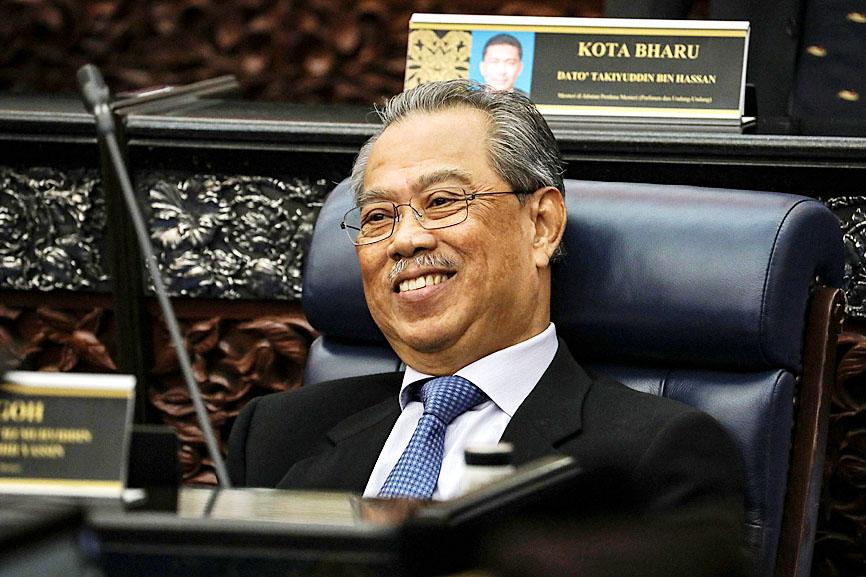Malaysian Prime Minister Muhyiddin Yassin yesterday narrowly won a motion to boot the parliament speaker, scraping through the first test of his support nearly five months after taking power.
The move came as parliament resumed after months of delay because of the COVID-19 pandemic. Its success could thwart the opposition’s bid of a no-confidence vote against Muhyiddin, analysts said.
Lawmakers engaged in heated debates over Muhyiddin’s unprecedented proposal to replace the house speaker with his own candidate.

Photo: Reuters
Voting later showed the government secured 111 votes, against 109 for the opposition, with one absent and another unaccounted for.
“The vote suggests that Muhyiddin’s government has the numbers to stay in power. Replacing the speaker is crucial because it is the speaker who decides if a vote of no-confidence can go ahead,” said James Chin, director of the Asia Institute at University of Tasmania in Australia.
“The vote also confirms what we know already, that is both sides are very close in terms of numbers and that Muhyiddin’s government is not stable,” Chin said.
Muhyiddin’s legitimacy has been challenged by the opposition since he was sworn in March 1 after a week-long political crisis.
He pulled his ethnic Malay party out of the ruling alliance, triggering its collapse, and formed a Malay-centric government with the opposition, including the party of former Malaysian prime minister Najib Razak, who is on trial on multiple graft charges.
Then-Malaysian prime minister Mahathir Mohamad resigned in protest of the plan, and filed a motion of no confidence against his former party ally.
Chin said the speaker replacement suggested parliament cannot act as an effective check and balance against Muhyiddin.
“Given that the new speaker is nominated by Muhyiddin’s government. I can bet that Mahathir will not to stand a chance in getting rid of Muhyiddin,” Chin said. “Muhyiddin is now in a much stronger political position after this.”
Ruling lawmakers said it was normal procedure to appoint new officers aligned with the new government, but Mahathir said the speaker should be neutral.
He said Muhyiddin’s move was unconstitutional.

‘IN A DIFFERENT PLACE’: The envoy first visited Shanghai, where he attended a Chinese basketball playoff match, and is to meet top officials in Beijing tomorrow US Secretary of State Antony Blinken yesterday arrived in China on his second visit in a year as the US ramps up pressure on its rival over its support for Russia while also seeking to manage tensions with Beijing. The US diplomat tomorrow is to meet China’s top brass in Beijing, where he is also expected to plead for restraint as Taiwan inaugurates president-elect William Lai (賴清德), and to raise US concerns on Chinese trade practices. However, Blinken is also seeking to stabilize ties, with tensions between the world’s two largest economies easing since his previous visit in June last year. At the

UNSETTLING IMAGES: The scene took place in front of TV crews covering the Trump trial, with a CNN anchor calling it an ‘emotional and unbelievably disturbing moment’ A man who doused himself in an accelerant and set himself on fire outside the courthouse where former US president Donald Trump is on trial has died, police said yesterday. The New York City Police Department (NYPD) said the man was declared dead by staff at an area hospital. The man was in Collect Pond Park at about 1:30pm on Friday when he took out pamphlets espousing conspiracy theories, tossed them around, then doused himself in an accelerant and set himself on fire, officials and witnesses said. A large number of police officers were nearby when it happened. Some officers and bystanders rushed

Beijing is continuing to commit genocide and crimes against humanity against Uyghurs and other Muslim minorities in its western Xinjiang province, U.S. Secretary of State Antony Blinken said in a report published on Monday, ahead of his planned visit to China this week. The State Department’s annual human rights report, which documents abuses recorded all over the world during the previous calendar year, repeated language from previous years on the treatment of Muslims in Xinjiang, but the publication raises the issue ahead of delicate talks, including on the war in Ukraine and global trade, between the top U.S. diplomat and Chinese

RIVER TRAGEDY: Local fishers and residents helped rescue people after the vessel capsized, while motorbike taxis evacuated some of the injured At least 58 people going to a funeral died after their overloaded river boat capsized in the Central African Republic’s (CAR) capital, Bangui, the head of civil protection said on Saturday. “We were able to extract 58 lifeless bodies,” Thomas Djimasse told Radio Guira. “We don’t know the total number of people who are underwater. According to witnesses and videos on social media, the wooden boat was carrying more than 300 people — some standing and others perched on wooden structures — when it sank on the Mpoko River on Friday. The vessel was heading to the funeral of a village chief in